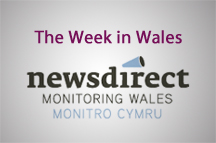 To date, Cardiff Bay has sidestepped many of the difficult questions around lobbying which have been posed in Holyrood and Westminster - but all that looks set to change.
To date, Cardiff Bay has sidestepped many of the difficult questions around lobbying which have been posed in Holyrood and Westminster - but all that looks set to change.
A couple of weeks ago, the Assembly’s Standards of Conduct Committee announced that it will undertake an inquiry into lobbying in Wales. Somewhat ironically, the decision to do so was made during a private session of the committee, and we have yet to see what shape the inquiry will take. More details will likely emerge after the Committee’s next meeting in November, though it’s (probably) safe to assume that any inquiry will be held in public.
Questions around lobbying have also been asked the Siambr recently. Neil McEvoy, a Plaid Cymru AM from the 2016 intake, has engaged in a series of feisty exchanges with the First Minister on Welsh Government transparency. Over the summer, he accused Carwyn Jones of failing to provide adequate safeguards against lobbying and went as far as to suggest that he was being dishonest with AMs. For the record, Carwyn Jones has asserted on several occasions that commercial lobbyists do not have access to Welsh ministers.
 Neil McEvoy has since been calling for an official register of lobbyists in Wales to be established, something which the Fourth Assembly’s Standards Committee fell just short of recommending back in 2013. He will lead a short debate next Wednesday on “bringing lobbying in Wales out into the open”, and has hinted that something will be “revealed”. Given that encounters between McEvoy and Carwyn Jones tend to be a somewhat raucous affair, I’d recommend keeping the popcorn at the ready.
Neil McEvoy has since been calling for an official register of lobbyists in Wales to be established, something which the Fourth Assembly’s Standards Committee fell just short of recommending back in 2013. He will lead a short debate next Wednesday on “bringing lobbying in Wales out into the open”, and has hinted that something will be “revealed”. Given that encounters between McEvoy and Carwyn Jones tend to be a somewhat raucous affair, I’d recommend keeping the popcorn at the ready.
Staying on the subject of transparency, this week has seen several of the Assembly’s committees take steps to better engage with the general public. The Culture, Welsh Language and Communications Committee, ahead of an evidence session with Lord Tony Hall, have called for suggested questions to be submitted via social media. Mark Reckless AM, Chair of the Climate Change, Environment and Rural Affairs Committee, broadcast live from Facebook on Wednesday, answering questions on agriculture put to him from members of the public. The only slight flaw in this democratic exercise was that nobody actually submitted any questions whilst the live feed was running.
Another digital initiative being trialed is the Dialogue app to facilitate online discussion of Wales’ legislative and policy challenges, although the number of people currently participating leaves much to be desired. And, very much in the spirit of Boaty McBoatface, an online poll is currently open to determine what the focus of the Culture, Welsh Language and Communications Committee should be in its next inquiry.
This utilisation of technology to try to strengthen democratic participation in Wales is long overdue, although it’s clear from some of the above examples that any reaction so far has been pretty underwhelming. But, in fairness, these things do take time. We are unlikely to see Wales follow in Estonia’s footsteps in becoming a truly digital democracy anytime soon – but in the context of such heated arguments over the transparency of government in Wales, it’s nice to see that the first few steps are being taken.














